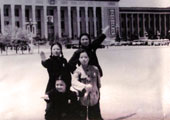
Japanese Prime Minister Shinzo Abe most wants to take advantage of the United States to modify the Peace Constitution, accelerate Japan's "normalization," and obtain permission to exercise the right to collective self-defense.
What Abe is worried about and fears most is that new U.S. Secretary of State John Kerry may think that China will bring more opportunities than challenges to the United States.
Abe is set to leave Thursday on a four-day visit to the United States. In less than two months after taking office, he has repeatedly called for closer Japan-U.S. alliance in order to cope with new threats in the Asia-Pacific region from China and the DPRK. However, he has not made clear how the Japan-U.S. alliance will be strengthened, what the alliance means in the new era, and what he most wants at the moment.
Abe's purpose appears to be adapting to the eastward shift of U.S. strategic focus and preventing China's "expansion." In fact, Japanese, Chinese, and Americans are clearly aware that Abe most wants to take advantage of the United States to modify the U.S.-enacted Peace Constitution, accelerate Japan's "normalization," and obtain permission to exercise the right to collective self-defense.
The United States has rewarded its loyal and useful ally Japan from time to time, but the bottom line is that it will not give Japan an equal footing. It will not allow a return of Japanese militarism, or pull Japan's chestnuts out of the fire.
Abe has not introduced specific measures to strengthen the Japan-U.S. alliance because times have changed, leading to changes in the targets of the alliance.
As the Soviet Union collapsed and China adheres to the path of peaceful development and seeks win-win cooperation, China-U.S. relations have gradually improved despite minor friction and occasional tensions. Kerry has questioned the necessity of increasing U.S. military presence in the Asia-Pacific region both before and after he took over as the secretary of state. He believes that the United States must make careful considerations, and try not to give China the feeling that it will be "encircled" by U.S. allies. This is what Abe is most worried about and fears most. If China and the United States continue to deepen bilateral cooperation, Abe's plan of strengthening alliance with the United States to contain China will become a complete joke. Just like the Japanese media said, Japan would be "marginalized" gradually.
In fact, Abe does not have to worry too much. In the foreseeable future, the United States still needs Japan to make trouble for China in a controllable range. Japan's next step depends on the attitude of the United States.
Read the Chinese version: 安倍访美所欲与所惧, Source: Jiefang Daily; Author: Wang Yusheng
















 Police dog on duty for first time in Chengdu
Police dog on duty for first time in Chengdu


![]()
